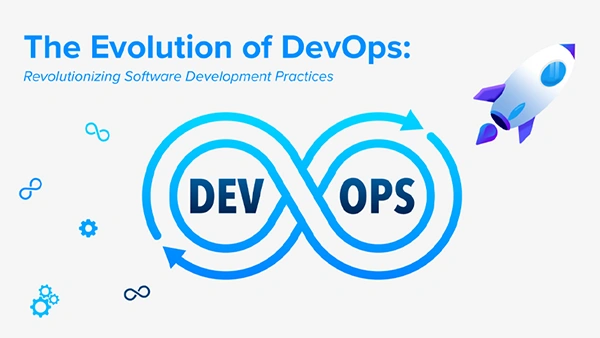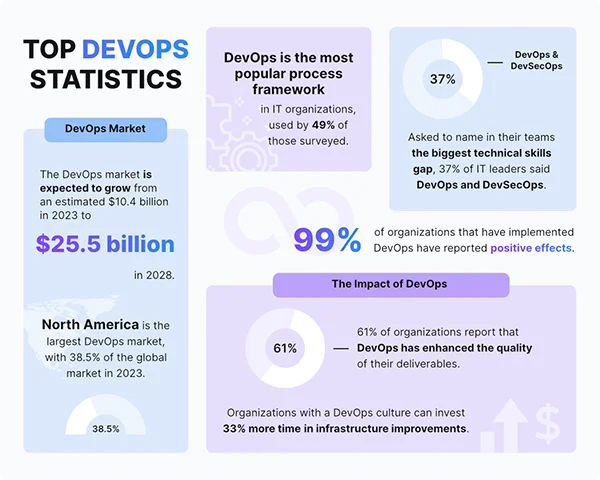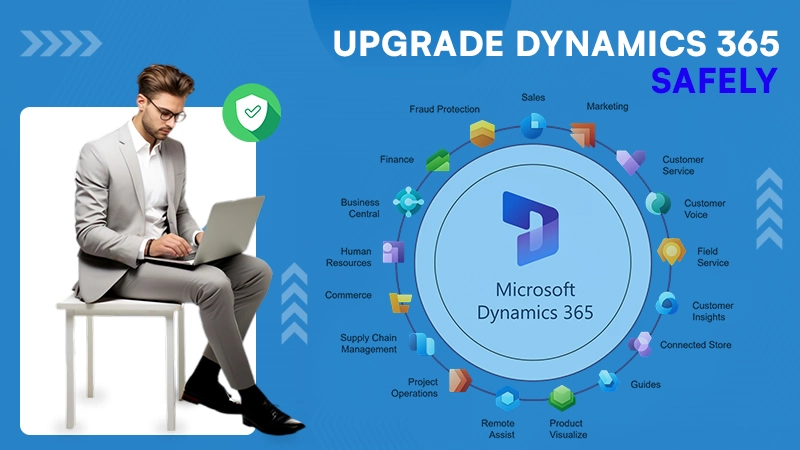
In today’s rapidly evolving digital landscape, the ability to deliver high-quality software swiftly and efficiently is a significant success factor for businesses, and this is where DevOps comes into play.
DevOps is a cultural and technical movement that aims to unify software development (Dev) and IT operations (Ops) to improve collaboration, increase deployment frequency, and enhance the quality of software products.
By integrating development and operations, organizations can respond more quickly to market demands and reduce the time to market for new features and fixes.
This article delves into the concept of DevOps, its benefits, and how to get started with its training and certification, so keep scrolling.
What is DevOps?
DevOps is a set of practices, principles, and tools designed to foster collaboration between development and operations teams.
It emphasizes automation, continuous integration and continuous delivery (CI/CD), and monitoring to streamline the software development lifecycle (SDLC).
The ultimate goal of DevOps is to create a more efficient, agile, and reliable development process.
Core Principles of DevOps:
- Collaboration and Communication: DevOps breaks down silos between development and operations teams, and fosters a culture of collaboration and shared responsibility.
- Automation: Its main focus is on automating repetitive tasks, such as testing, deployment, and infrastructure management.
This reduces errors, speeds up processes, and frees up team members to focus on more strategic activities.
- Continuous Integration and Continuous Delivery (CI/CD): CI/CD practices involve continuously integrating code changes into a shared repository and delivering them to production in smaller, incremental releases.
This approach ensures that software is always in a deployable state and accelerates the delivery of new features and updates.
- Monitoring and Feedback: Continuous monitoring of applications and infrastructure provides valuable feedback that allows teams to swiftly identify and address issues, optimize performance, and improve user experience.

The Benefits of Adopting DevOps
1. Faster Time to Market: It enables organizations to release software more frequently and respond faster to changing market needs all by ng development and operations processes.
2. Improved Quality and Reliability: Automation and continuous testing reduce the risk of errors and enhance the quality of software which leads to more reliable and stable applications.
3. Enhanced Collaboration: It also fosters a culture of collaboration between development and operations teams and improves communication, and breaks down traditional silos.
4. Greater Efficiency: Automation of repetitive tasks and processes leads to increased efficiency, hence, allowing teams to focus on innovation and strategic initiatives.
Getting Started with DevOps: Training and Certification
For those looking to adopt or enhance their DevOps practices, training and certification are necessary, and one prominent option is the Intellipaat DevOps Course.
This comprehensive course provides in-depth knowledge and hands-on experience in DevOps practices, tools, and methodologies.
Key Features of the Intellipaat DevOps Course:
- Comprehensive Curriculum: The course covers a wide range of DevOps topics, including version control, CI/CD, containerization, orchestration, and cloud platforms.
- Hands-On Labs: You can gain practical experience with real-world scenarios and tools through interactive labs and projects.
- Expert Instructors: Also, learn from industry professionals with extensive experience in DevOps and related fields.
- Certification Preparation: The course prepares students like you for leading DevOps certifications, such as AWS Certified DevOps Engineer and Docker Certified Associate, which are highly valued in the industry.
- Flexible Learning: Moreover, the Intellipaat course accommodates different schedules and learning preferences with options for online and self-paced learning.
As per the Research,
86% of organizations see the value of DevOps as important to have (Harvard Business Review).
The Future of DevOps
The DevOps landscape continues to evolve as new technologies and practices emerge, and the key trends that shaping the future of DevOps include:
1. Increased Adoption of AI and Machine Learning: AI and machine learning are being integrated into DevOps processes to enhance automation, predictive analytics, and incident response.
2. Evolution of CI/CD Tools: The development of advanced CI/CD tools and platforms is making it easier to manage complex deployment pipelines and ensure continuous delivery.
3. Expansion of DevOps in Cloud Environments: Cloud-native DevOps practices are becoming more prevalent, hence, enabling organizations to leverage cloud resources and services for greater scalability and flexibility.
4. Emphasis on Security (DevSecOps): Integrating security into the DevOps process (DevSecOps) ensures that security considerations are addressed throughout the development lifecycle, rather than as a separate step.
Conclusion
DevOps is a transformative approach to software development and operations, offering numerous benefits such as faster time to market, improved quality, and enhanced collaboration.
By adopting its practices, organizations can streamline their development processes, respond more swiftly to market demands, and achieve greater efficiency.
For those interested in mastering DevOps and advancing their careers, the Intellipaat DevOps Course provides a thorough and practical education in DevOps principles and tools.
Lastly, holding to DevOps not only improves the development process but also positions organizations for future success in a rapidly changing technological landscape.
Also Read: Utilizing Software to Study Opponent Tendencies










